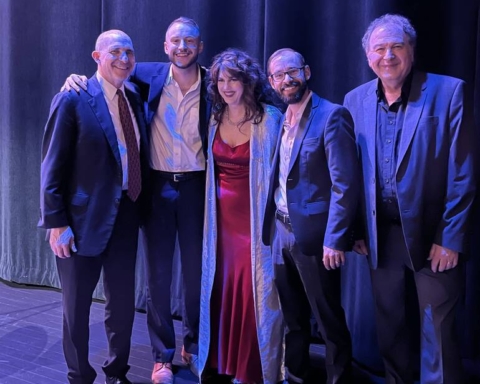Doubling the number of ministers in residence from four to seven at the same time freshmen enrollment reaches an all-time high ended up being a blessing in disguise.
Their role is particularly important as they act as an additional resource for students in their residence halls, while also promoting a Franciscan way of life. Since there hasn’t been this many ministers in residence in a few years, the ministers spent time forming a mission statement for their role on campus.
“The increase in the number of MIR [ministers in residence] is an amazing thing. It shows that the ministries is not only surviving, but it is thriving,” Dominic Caropreso, a graduate business administration student, said.
At one point, anyone who worked with university ministries lived on campus and was considered a minister in residence. Before that, just friars and sisters, and at the start of our university, only friars. Now, only two of the ministers in residence are a friar and sister: Fr. Peter Schneible, O.F.M., chair of the biology department, and Dr. Paula Scraba, O.S.F., an associate professor in the school of education.
Schneible has been a minister in residence for 25 years. Although being a full-time professor restricts his availability, he keeps his door open for an hour every night. Since he lives in Shay and Loughlen Halls, he also makes a point to talk and check in with the resident assistants in the duty hut during the weekends.
“I’m an adult presence to ask or answer any questions, whether it be an academic question, religious question, and oddly enough, I’ve even had dating questions,” Schneible said.
In fact, Schneible has married more people he had while being a minister in residence than former students in the classroom.
“I’ve had people come in just to talk because of relationships or friendships broken up, religious discussions with non-Catholics and Christians,” Schneible said.
Like Schneible, Scraba emphasized their role of presence on campus. Known for hosting popcorn Tuesday in the fourth floor lounge of Devereux Hall, Scraba’s tradition began when all the ministers in residence would host an event once a week.
“Being a minister in residence, that’s my ministry, that’s what gives me life,” Scraba said. “It’s about presence, dialogue and witness.”
The timing of the new vice president of student affairs, Katie O’Brien, requesting an increase in the number of ministers in residence worked out well, according to Scraba.
Scraba said O’Brien understood the importance of having ministers in residence and helped ensure that the addition of four ministers in residence would become a reality.
“It was Rick Trietley. When he was VP, he was the one that made sure the ministers in residence, those of us that were here through all the changes, had a place that would be conducive to working with students,” Scraba said about their placement during the Robinson and Falconio Halls’ renovations in 2014.
All of the new ministers in residence are graduate students working as graduate assistants in the McGinley-Carney Center for Franciscan Ministry.
“I interned with Amanda in University Ministries last year and gained an appreciation for all of the often overlooked or unseen things ministries does on this campus,” M.K. Killen, a graduate business administration student, said. “When Amanda told me about the initiative to add more ministers in residence, I jumped at the opportunity to connect other students with these programs on campus.”
While ministers in residence don’t do rounds or write-ups, if they witness students being disruptive or destructive, they have a duty to report it.
“Most of our time in the residence halls is spent talking to students—from something as simple as a hello in the hallway to something as serious as grief counseling,” Killen said.
They also serve as a bridge for ministries and students to connect by living among students.
“I like to tell people that I’m just like them: not perfect, flawed, but dependably available,” David Andoh, a graduate business administration student, said. “My main responsibility, however, is to foster a sense of community among students and the campus community.”
Caropreso emphasized how they serve as guides to help students find their own path through their college lives.
“Whether they need a person to talk, someone to open up the door, answer spiritual questions, or simply just to talk,” he said.
Amanda Naujoks, associate director of University Ministries, who pushed for the increase in ministers in residence, said the purpose of the ministers in residence program is to “help build community in the residence halls and expand the Franciscan understanding of family.”
In her initial job offer, being a minister in residence was not part of her role on campus.
“When I was a student here, I thought the ministers in residence were one of the most important parts of my Bonaventure experience,” Naujoks said. “So, when I thought about coming back here to do campus ministry, I expected [being a minister in residence] to be part of the job and it wasn’t.”
She was told she didn’t have to be a minister in residence, however, she wanted to be present on campus and available to students, so she made it a condition when accepting her job.
For Maygan Payan, a differentiated education – gifted & students with disabilities – graduate student, her experience with the minister in residence on her floor freshman year sparked her interest in the program.
“Although I didn’t see him often, I really liked what he stood for. And I was at a place with my faith where I felt I could do this job and wanted to fulfill the responsibilities of what it is to be a minister in residence,” said Payan.
Similar to Schneible and Scraba, Payan believes in the importance of having a presence on her floor to create a connection and community with her residents.
“I like to feel that I’m present on the floor by having my door open or sitting in the lounge,” Payan said. “Every weekend, I’ve sat in the lounge during the times people are leaving, and I tell them to have fun and be safe, and I try to make it until they get back.”
She also discussed the challenge she has faced as a minister in residence trying to differentiate her role from that of an RA.
“I let them know I want them to have fun, but I’m here if they need someone,” Payan said.
In addition, Scraba has made a point to make her presence known outside of her immediate floor of responsibility.
“By having extra hands on deck for programming and just being a presence and sitting in the lounge,” Scraba said. “I’ll walk through buildings and just say, ‘Hey, what’s everybody watching?’ and cut through buildings, even if I don’t live there anymore, to say, ‘What’re you making? That smells really good’ if they’re making something.”
As a whole, University Ministries is heading in the right direction by doubling its presence on campus.
“I think the initiative is awesome because it speaks to the direction that the university is looking to go,” Andoh said. “Before this year, the ministers in residence were kind of a mystery.”






